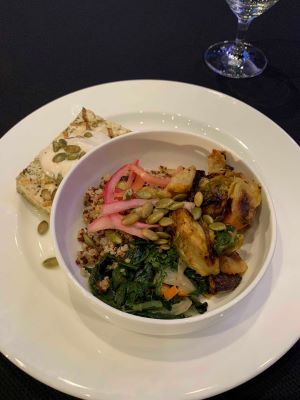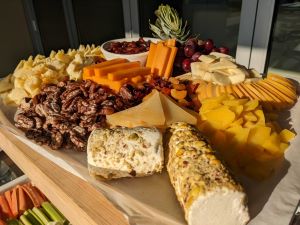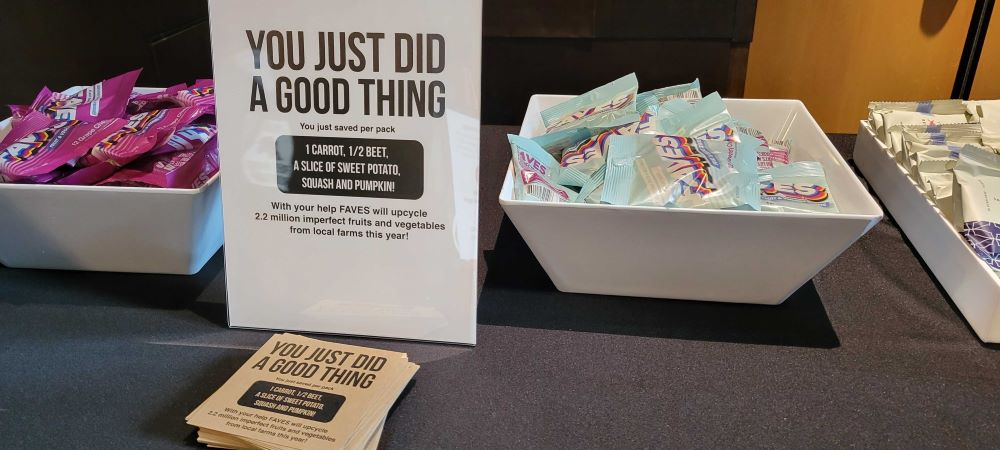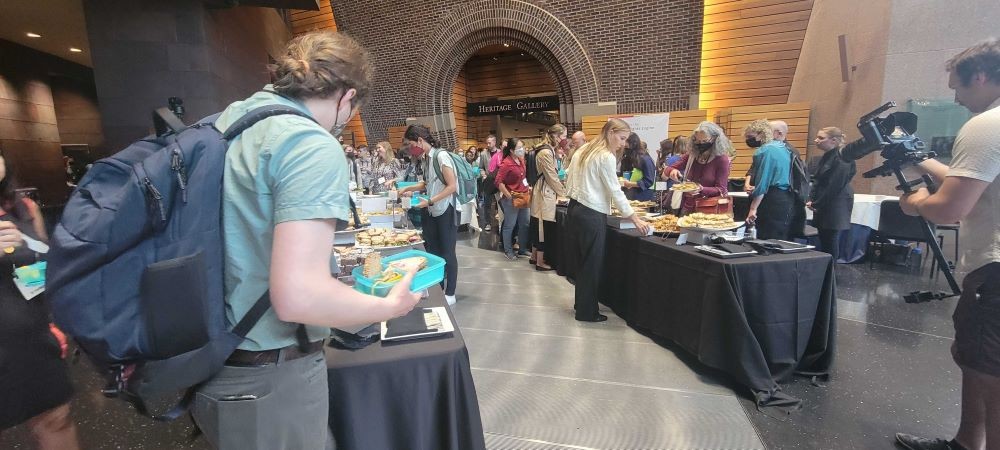It’s a dirty little not-so-secret that meetings and conventions are rife with food waste. Who hasn’t been taken aback when seeing banquet trays full of fancy fare scraped off into a waste bin instead of prepared for delivery to a local food pantry or other charitable organization that provides sustenance to the food insecure?
Even planners who push back at venues that are reluctant to donate leftovers that are acceptable for donations are often hesitant, even after quoting the Bill Emerson Food Donation Act, which grants federal protection from civil and criminal liability in relation to food donation.
[Free On-Demand F&B Sustainability Webinar With Nancy Zavada]
And food waste is not the only concern when it comes to holding a sustainable F&B component, as there is a growing movement to reduce the carbon footprint at large gatherings by cutting back on serving meat.

“Food waste is a huge issue now. It’s a thing and a very well-funded thing,” said Nancy Zavada, founder and president of MeetGreen, about the importance large corporations are placing on combating food waste and promoting sustainable F&B concerns at their meetings and events. “The corporate clients that are reporting on carbon counting are hell bent on doing this. One [I know of] has 30,000 meetings per year, and they want one vegetarian meal per event.”
“That’s all you have to do—don’t fret about it. Do that,” Zavada added about offering a vegetarian meal. “They’re being sustainable because big corporations want to look good, and they also want to save money, and they’re thrilled about how much money they’re saving.”
According to Zavada, many associations are still behind the curve a bit when compared to large corporations.
“They don’t have to report to anyone on climate change—they’re not on Nasdaq,” she said. “And corporations are not basing their income on their annual meeting.
[Related: Have Sustainable Meetings Been Put on the Backburner?]
“The cool stuff happening with food is carbon accounting and food waste—there’s some cutting-edge stuff going on out there and it’s fun,” added Zavada, a person whose idea of fun is a bit more elevated than most. “I think it’s a new emphasis. When it comes to sustainable food, there’s organic and seasonal and all the usual terms, but now we’ve added protein in the mix—is it plant-based protein?
“Can we serve one plant-based meal a day or one plant-based meal an event, and not have to serve meat?” she asked. “It lowers your water use, it lowers your carbon footprint, it lowers your budget, and if you do it right, people don’t notice. It’s fascinating; instead of opting out for vegetarian, people have to opt-in for meat. Here’s your vegetarian meal, and now you can add beef or chicken—it’s a flip on the way we’ve done things.”
[Related: 10 Easy Ways to Boost the Sustainability of Your Event]
Two Examples of Cutting-Edge F&B Sustainability
Ever ones to put their money where their mouths are, MeetGreen recently organized two conferences that showcased two of the most interesting strategies to increase F&B sustainability: food waste reduction and cutting back on serving meat.
Following are details and comments about the two events from the MeetGreen team leaders who organized them.
CleanMed, May 10-12
Loews Kansas City Hotel
350 in-person attendees

MeetGreen Event Lead: Britta Ehnebuske, Director of Virtual Events
The premier national conference for leaders in healthcare sustainability, CleanMed’s goal is to provide a platform to connect those at the forefront of implementing climate-smart health care innovations, environmentally preferable purchasing, sustainable food strategies, greening the operating room and renewable energy.
CleanMed is an annual event that’s presented by Practice Greenhealth, a membership and networking organization that describes itself as an international coalition promoting environmentally responsible health care and advocating for environmental health and justice.
Beyond its typical event sustainability strategies and overall management of the conference, MeetGreen implemented a DefaultVeg initiative to make plant-based food the default and give people the choice to opt in for meals with animal products.
“In registration, we gave attendees the option to opt-in for meat,” Ehnebuske said. “We basically took the hotel menu options and worked with DefaultVeg on ways to tweak them to put together a menu with vegetarian and vegan options [as the default choices]. It’s putting the whole thing on its head.
[Related: The Rise of Plant-Based Alternatives on Event Menus]
“The actual banquet staff were trained and understood,” she added, “and the -people who would get meat would mark that during registration and have that on their badge.”

Ehnebuske said it was key to include the information in the contract with the venue, to ensure banquet staff would carry out the strategy successfully, and also to make sure food was labeled properly in buffets so everyone could make their own choices.
“I think people thought it was an interesting thought experiment—switching places with the people that say, ‘I need a special meal,’” she said. “It was a good thing to put into people’s brains to think different, and the food was actually delicious. I think the hotel rose to the occasion and really gave us awesome meals.”
Of course, as at any conference, there was at least one attendee that tried to buck the system.
“We had an attendee who put their own mark on their badge that they wanted to get meat, and they didn’t do that in registration, but we accommodated them with that,” Ehnebuske laughed. “I think it was more confusing for the banquet staff than attendees, but after the first day it was fine.”
Sample menus at CleanMed included the following items:
Plated Lunch

Vegan: roasted vegetable medley; coconut milk yogurt; quinoa powerbowl with roasted vegetables; pumpkin seeds; pickled onion; kale; roasted potatoes; eggplant tapenade; olive (protein). Vegan/vegetarian: grilled tofu. Meat: grilled chicken
Breakfast Buffet
Vegan: bagels/muffins; yogurt/fruit. Vegetarian: scrambled eggs; French toast; veggie quinoa hash. Meat: bacon; chicken sausage
Buffet Lunch
Salad station with romaine; tortilla strips; queso fresco; vegan chipotle Caesar dressing; vegan black bean soup; street corn salad; jicama; queso fresco; achiote mayo; cilantro; vegan refritos; arroz Mexicano; Baja-style grilled fish tacos or marinated tempeh; corn tortillas; flour tortillas; Bibb lettuce leaves; churros with chocolate sauce; tres leches cake; coffee
“Demographically, they’re all not vegan by any stretch of the imagination,” she said, “but I think we were able to make significant reductions to the carbon footprint from years past.”

Ehnebuske said any concerns she had were quickly alleviated.
“I definitely had trepidations about implementing default vegan options, but I learned that it was pretty easy to tweak these existing menus to be vegan,” Ehnebuske said of the main challenges for the event. “It demystified it a bit for me, so I would definitely promote it to another client now. It’s not as difficult as I thought it would be. We now have a sort of turnkey option to present to other clients.”
Food Waste Solutions Summit, May 10-12
McNamara Alumni Center, University of Minnesota
643 attendees: 391 in-person
and 252 virtual

MeetGreen Event Lead: Jennifer Byrn, Director of Sustainable Events
The Food Waste Solutions Summit is presented by ReFED, a national nonprofit working to end food loss and waste across the food system, and strives to be the premier annual food waste event, bringing together food businesses, funders, solution providers, innovators, policymakers, nonprofits and others to drive the adoption of solutions to reach a collective goal of a 50% reduction in food waste by 2030. The summit featured panels, working sessions, field trips, networking events and innovator demos.
The more revolutionary of the two MeetGreen F&B sustainability efforts was conducted for the Food Waste Solutions Summit, in that it upcycled F&B items at the event and repurposed them into subsequent F&B servings.
As one can imagine, implementing an F&B program that uses “recycled” food was a challenge that was overcome with an abundance of communication.
“We had communications early on with the venue,” Byrn said. “They had a lot of partnerships in the food space, so bringing in a lot of those partnerships to work on the menu and bring the caterer on board was essential, along with conversations with the chef. McNamara Alumni Center has a required caterer, so we had no choice but to work with them.”
Byrn called out some of the more-interesting upcycling examples.
“We made pesto beet hummus using the beats from another time in the conference, using the beat greens, and we took the tops of the fruit garnishes—strawberries and other fruit garnishes—and made smoothies,” she said. “We had hard-boiled eggs out for breakfast on Wednesday, and then used the leftover shells and ground them finely to make a veggie burger, and we used pork shoulder bones from earlier for bone broth shooters later that evening.”
[Infographic: MeetingGreen's Keys to Sustainable & Safe Meetings]
Sustainability Metrics
CleanMed
According to Ehnebuske, following are the sustainability metrics attributed to the DefaultVeg strategy.
Percentage of protein emissions/water use cut:
- Emissions (CO2 Eq): 51%
- Land use (m^2/a): 21%
- Water use (gallons): 37%
- Absolute numbers:
- GHGs: 393 kg saved (This is like driving nearly 1,000 miles or fully charging nearly 50,000 smartphones.)
- Water use: 186,505 gallons saved (This is like taking over 9,300 showers.)

Food Waste Solutions Summit
Following are additional food waste/reduction highlights provided by Byrn:
- The signature drinks were made with SPARE Tonic, using leftover whey from Greek yogurt, at the welcome reception held at the Graduate Hotel. The Graduate Hotel, in a rare exception, allowed us to bring in D’Amico catering, the in-house provider from McNamara Alumni Center, because it meant we would be allowed to truly further our food waste reduction efforts and utilize leftover food in other meal periods later in the conference.
- Regrained pasta, made from leftover hops and grain from breweries, was utilized for a pasta salad on the final day.
- Candy and cookies were provided from Faves Candy and Renewal Mills. Both companies practice upcycling to make their products, and we were able to get contract language included with the caterer that we could use these partnered products in our coffee breaks.
- D’Amico Catering allowed us to use any leftover desserts, pastries and smoothies during coffee breaks or in the next meal period to help us omit food waste.
- Tupperware was a sponsor and donated compartmented containers for the final lunch so any leftover food could be taken by attendees. A rare exception was also granted on this, so all we had to do was sign a waiver of release of liability to the caterer.
- An organization called UpCycled set up a booth to allow people to sample/take various brands of upcycled products. They had everything from dog biscuits to salmon burgers.
Read Next: The Future of Sustainable Business Travel in the Meetings Industry







